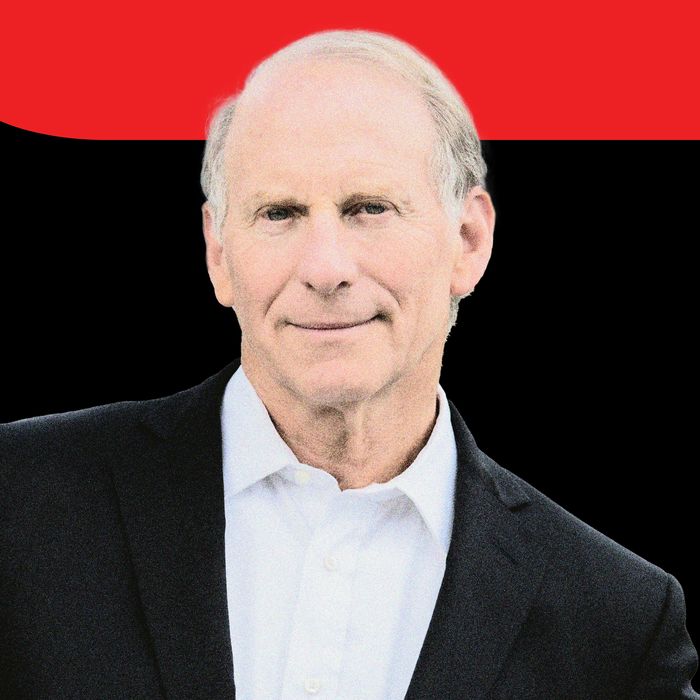
From the recent armed confrontation with a trespassing Chinese spy balloon to the ongoing war in Ukraine and Iran’s nuclear-enrichment efforts, there’s no shortage of foreign-policy challenges for the U.S. right now. So for the latest episode of On With Kara Swisher, Kara spoke with Richard Haass, a veteran of four presidential administrations and the longtime leader of the Council on Foreign Relations think tank. In their ranging conversation, they review both Biden’s and Trump’s efforts abroad and discuss the road ahead for Russia and Ukraine. Haass also reflects on his long career in foreign policy, details his discomfort with the present-day GOP, and, as excerpted below, explains why spy balloons are the least of the Biden administration’s problems when it comes to U.S.-China relations.

On With Kara Swisher
Subscribe on:
Kara Swisher: How important is Putin’s recent announcement that Russia would suspend its participation in the new START nuclear-arms-control agreement — which is different than pulling out of the agreement. Is it mainly symbolic, or does this move have real consequences?
Richard Haass: It’s mainly symbolic. The agreement has roughly four years to go. Russia is not gonna break out of the numerical caps that have been established on launchers and warheads. They’ve already not been cooperating on inspections. So in some ways, this just underscores what they’ve already stopped doing. I think the real question comes in four years, but right now I don’t see this as a big deal.
Swisher: So what would be the new agreement?
Haass: Well, ideally, it would establish caps, not just for the United States and Russia going forward beyond four years from now, but it would include China. ’Cause one of the lessons China’s taken from this war — it’s very interesting — China said, Hey, the United States is not getting involved directly on the ground in Ukraine. China is saying, Why? Their answer is Because they’re worried about Russian nuclear weapons.
Swisher: Right.
Haass: So China’s saying to itself, Wow, if we had a thousand more nuclear weapons, maybe the United States wouldn’t get involved directly on behalf of Taiwan. But if China does ramp up its nuclear weapons — and it seems they’re doing so, Kara — they have gotta be a part of future great-power arms control or it doesn’t make sense.
Swisher: Right. So let’s move on to China. As you mentioned, Russia is, of course, enjoying this no-limits friendship with China — a country that seems to be testing America’s patience with spy balloons and more. Tony Blinken, the secretary of State, canceled his visit to China but met with the country’s top diplomat, Wang Yi, last weekend. Where is the U.S.-China relationship right now?
Haass: It’s in terrible shape. It’s a relationship, in some ways, in search of a rationale. After the Cold War ended three decades ago, we built up this extensive economic relationship. We’ve now soured on the economic relationship. Plus, Xi’s been in power for a decade now. It’s far more repressive at home, far more statist economically, far more assertive in its foreign policy — in ways that are clearly unhelpful. So the question is, you know, what rationale does it have? I would say right now, not much of one. I can’t see, really, an upside. China, for example, refuses to cooperate with us on reining in North Korea. So I actually think that the challenge right now is to avoid major downsides. Can we, for example, persuade China not to become a major source of help to Russia? Can we somehow put some guardrails on our differences over Taiwan?
You know, sometimes in foreign policy, it’s what you want to achieve. I think in the case of China now, we’ve reached a point where the relationship is about what we want to avoid.
Swisher: Avoid. Wow. I mean, and also there’s all this domestic [tension] — on both sides, bipartisan committees and Congress, Biden going off quite a bit. He’s been going off quite a bit on a lot of things, but is it the worst it’s ever been? And what do we need to avoid?
Haass: Well, it’s the worst it’s been since the modern relationship was established, you know, over 40 years ago. So I take that seriously, and yeah, there’s a kind of almost unhealthy competition between Republicans and Democrats: Who can be harder-assed towards China? And I’m hard-pressed to say there’s any real difference between the Trump and Biden administrations’ policies on China.
Let me put it this way: I think China has the ambition on Taiwan to ultimately take Taiwan. I don’t think they’re poised to do it tomorrow for lots of reasons, but that’s their ambition. The goal of our foreign policy ought to be to deter them. But look, this is the relationship of this era of history, and it will go a long way towards defining it.
And imagine if we do have a major crisis — much less, conflict — I think it’s catastrophic for the world economy. And I can’t exaggerate how significant it could be for order in the world.
Swisher: Yeah, I mean, many years ago I was talking about their surveillance economy, and obviously a lot of escalation is covert. And we saw this with the spy balloon, which cost some enormous amount to shoot down.
Haass: It’s a bad exchange ratio.
Swisher: Yeah, exactly. For, like, the air balloon. The media reaction — they loved it, of course. I just feel like we must be spying on them; they must be spying on us.
Haass: We all spy on each other. I mean, that’s why God invented satellites. We do espionage on them; they do espionage on us. If you remember years ago, they got all the personnel records out of the Office of Personnel Management. But one thing they do to us, which I don’t think we do to them, is economic espionage. That’s been a big part of Chinese development strategy, to steal secrets from our firms to accelerate their economic advance.
So, you know, the spy balloon was sort of something slightly different. My guess is — I can’t prove it — the Chinese had done it many times before. It hadn’t triggered a reaction. I do not think — indeed, I’m 99 percent certain I do not think — they were trying to cause an accident or an incident. I don’t think they wanted to scuttle the Blinken trip. China had been on something of a charm offensive since Biden and Xi had met in Bali on the margins of the G20. So to me, they just didn’t expect this to be seen and to cause the reaction It did.
I actually think the secretary of State made a mistake in canceling his trip. I would’ve said go. You have diplomacy because you have problems. Also, think about it: Imagine we had shot down the balloon and Tony Blinken was on a plane the next day. How perfect is that? How perfect is it? Then it would’ve put China in the awkward position of saying what? You’re not welcome because you shot down a balloon that was spying on you. That’s kind of an awkward position. And I think the reason we did this is, again, the administration feels itself — that it’s locked in a kind of competition with the Republicans. It didn’t want to get criticized for doing diplomacy while China’s spying on us. Well, look, we do diplomacy all the time with countries that spy on one another.
This interview has been edited for length and clarity.
On With Kara Swisher is produced by Nayeema Raza, Blakeney Schick, Cristian Castro Rossel, and Rafaela Siewert, with mixing by Fernando Arruda, engineering by Christopher Shurtleff, and theme music by Trackademics. New episodes will drop every Monday and Thursday. Follow the show on Apple Podcasts, Spotify, or wherever you get your podcasts.
More From 'on with kara swisher'
- Ron Klain Still Thinks Biden Got a Raw Deal
- Gretchen Whitmer on Why She’s Still Confident in Biden
- AOC on Gaza, Insults, AI, and Whether Trump Will Lock Her Up





























